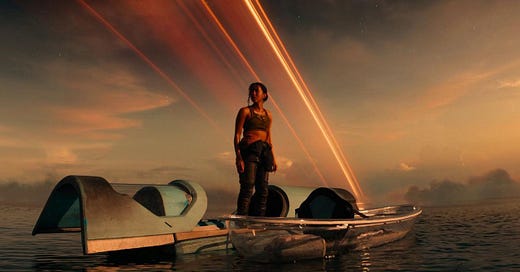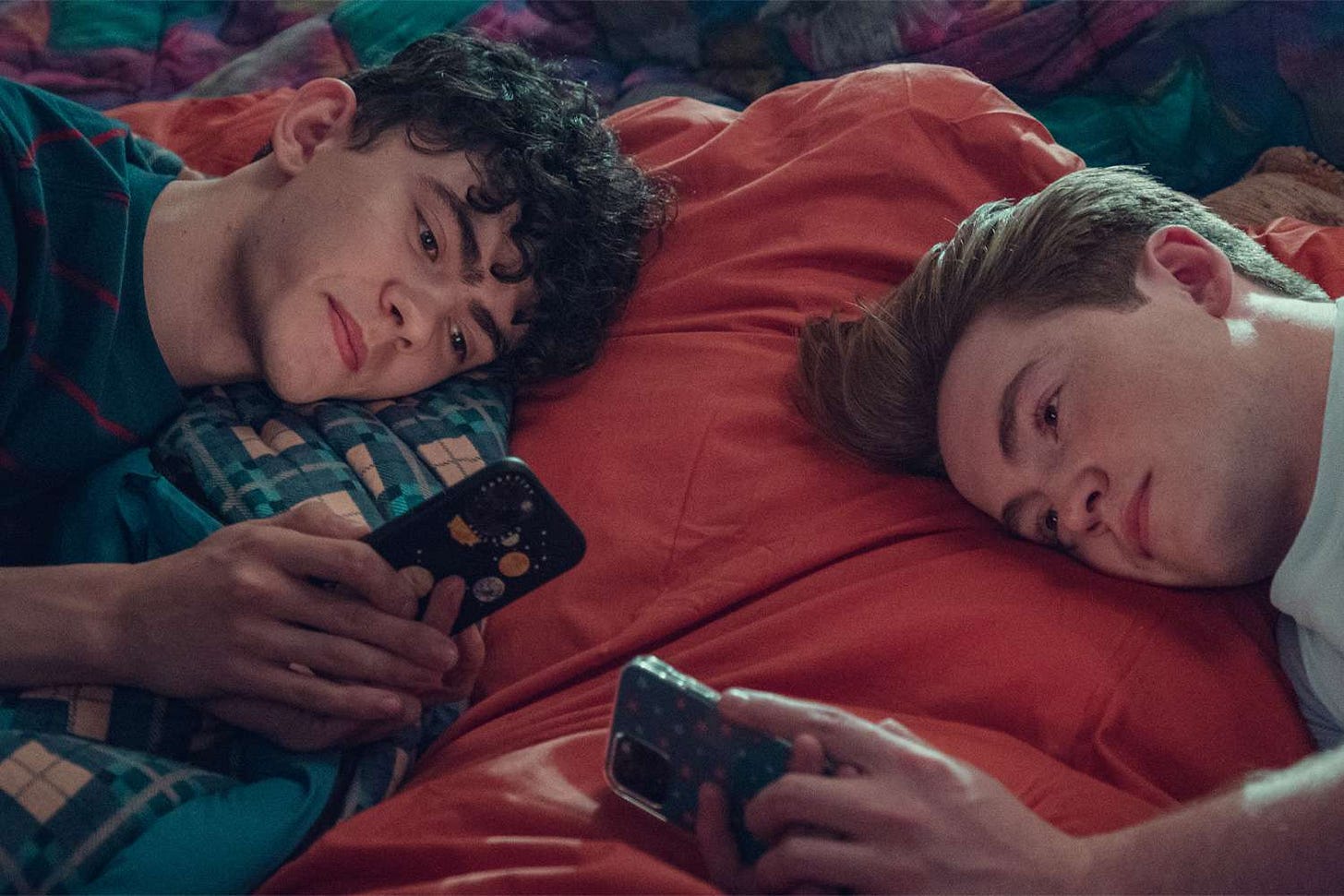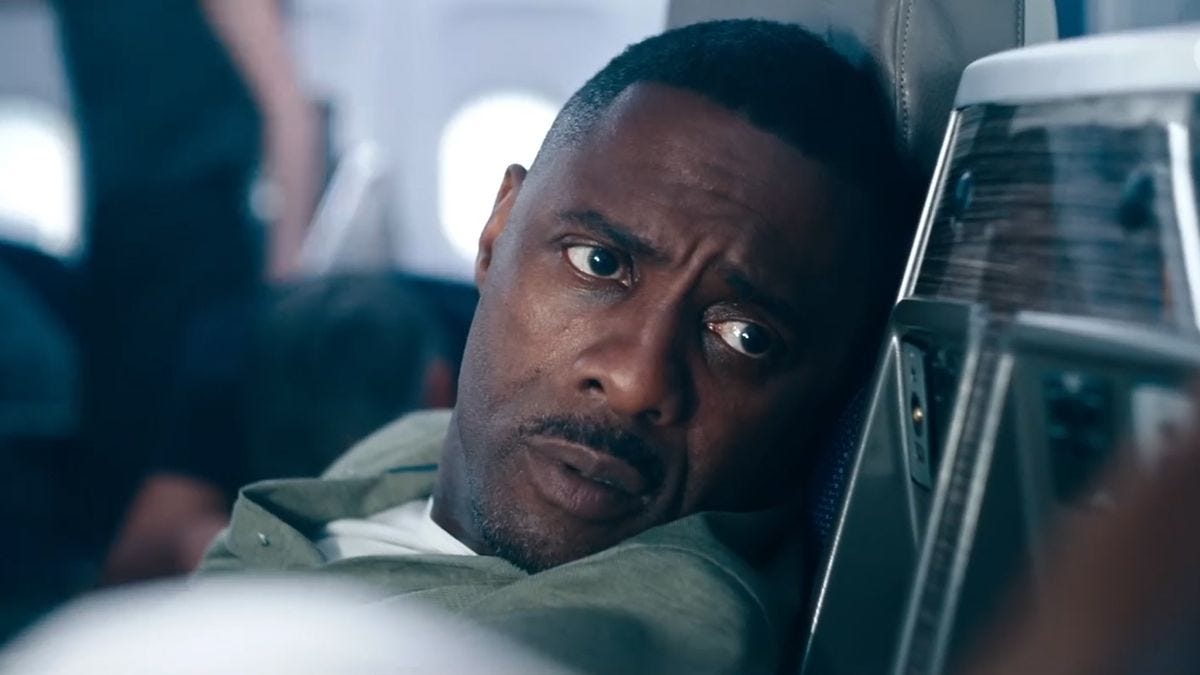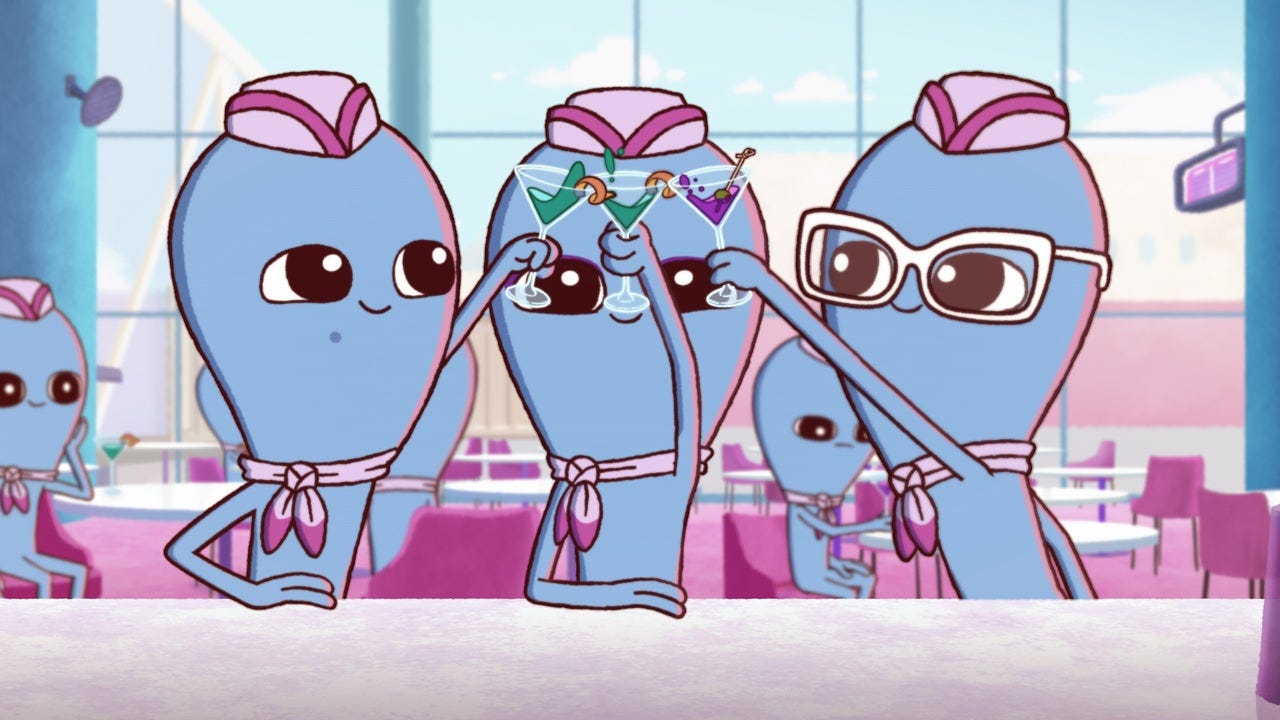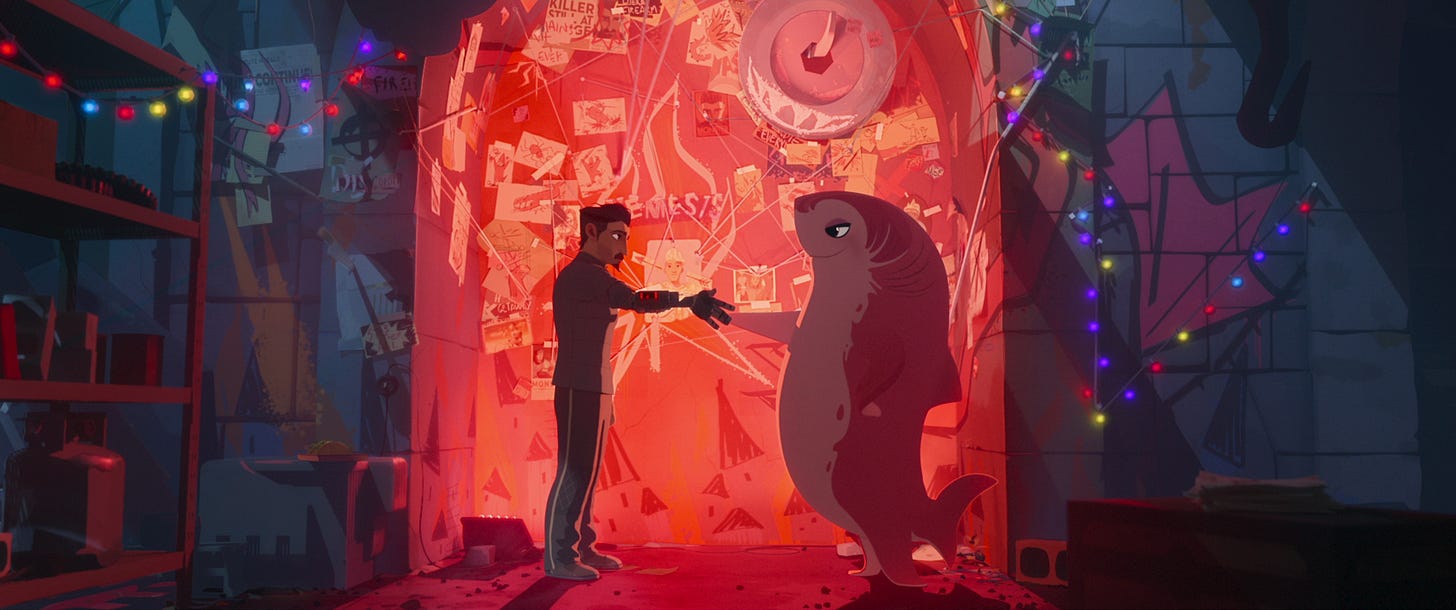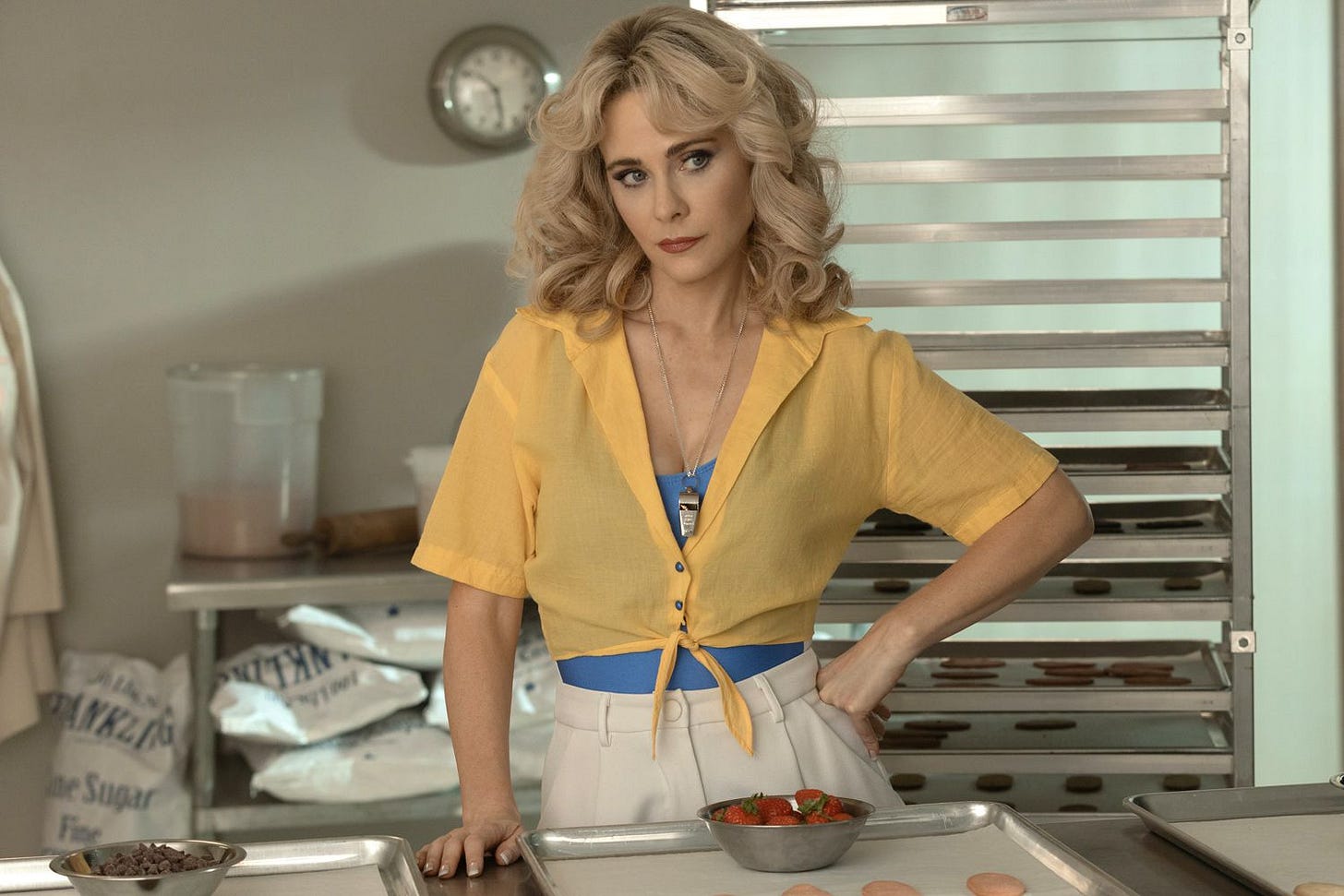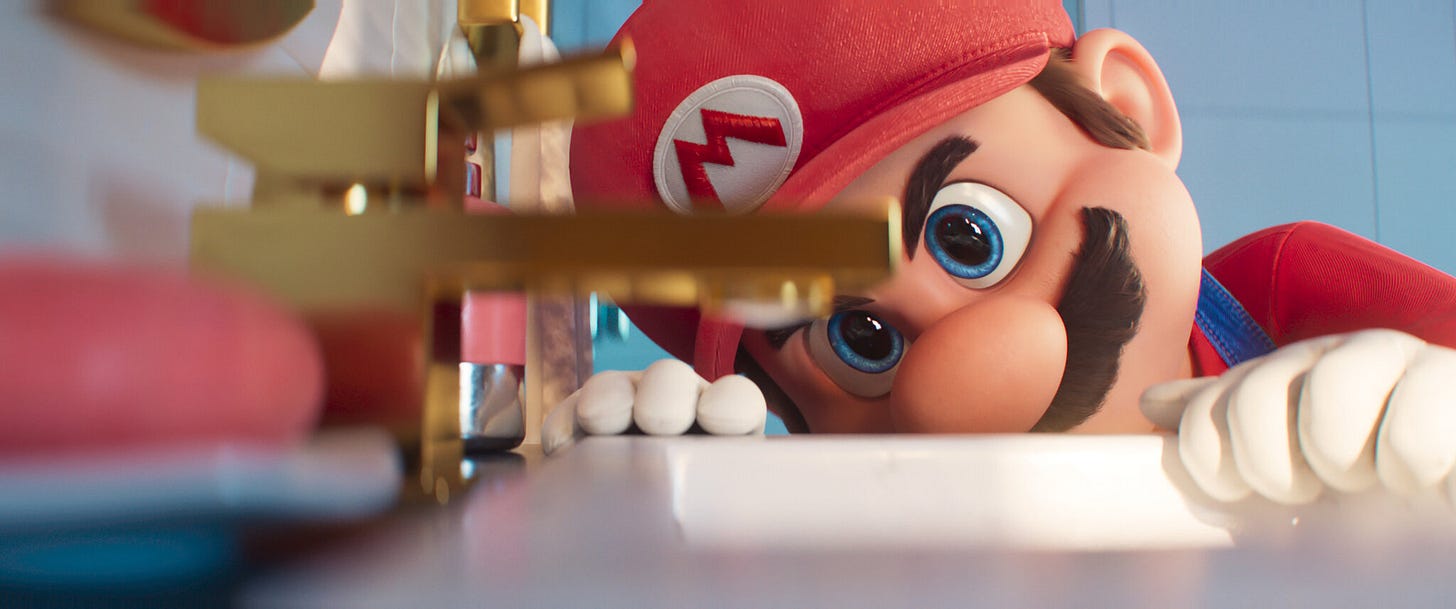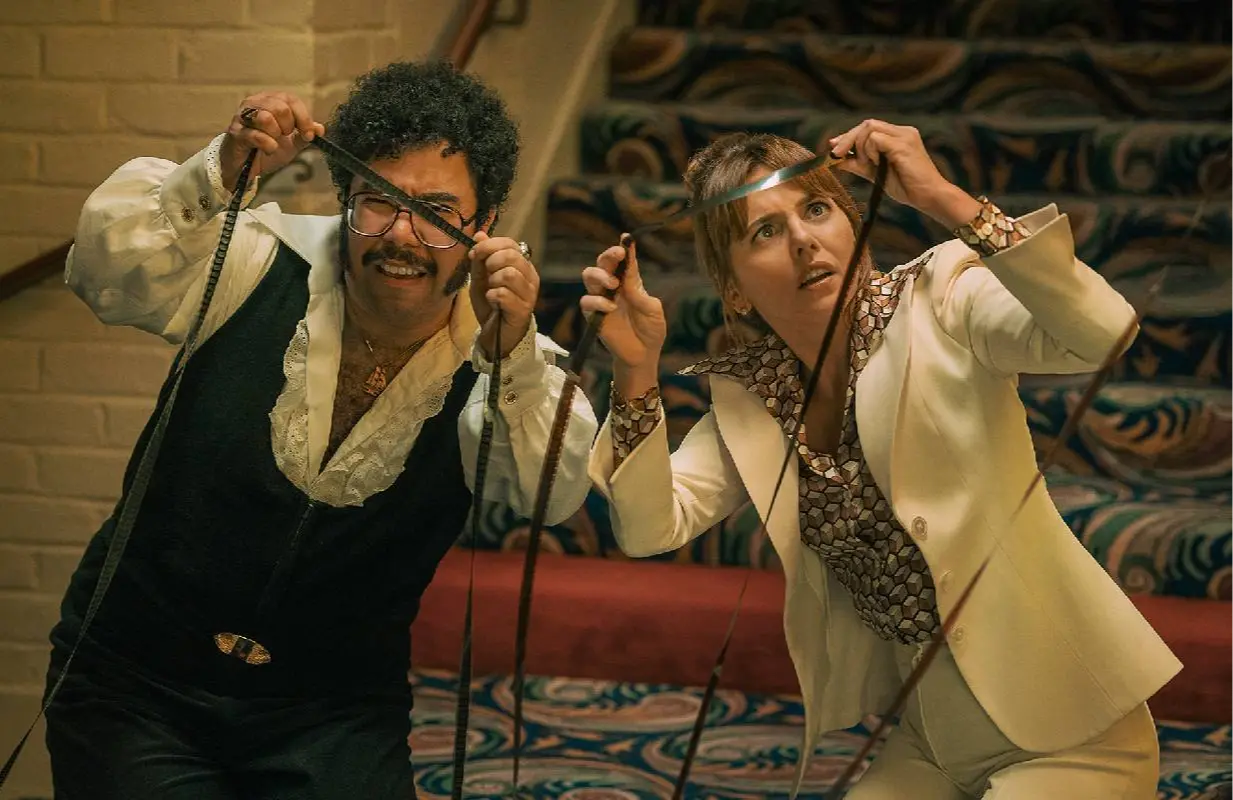How was peak summer for you, readers? July always seems to go by so quickly for me. I spend all June with the mental comfort that at least two whole months of summer remain for me to enjoy, then all July with hardly a thought about summer at all, and finally all August wondering how it all went by so quickly.1
And what do we have to show for it? A still lingering sunburn, memories of a watermelon salad, photos from the water?
Well, I can’t say for sure what you have yourselves, readers, but I can say that together we have this new serving of ‘Hot Tea’ at least to enjoy. So, take a break from your summer reflections and delight in the return of an ambitious sci-fi drama about power struggles, a colorful animation about metamorphosis, a comedy about philosophy and pornography, or a song-and-dance take on true crime, all among our offerings this time.
Foundation (Season 2 Premiere)
Apple TV+ • Sci-Fi • The Erosion of Expertise
Synopsis
Fragility spurs a galactic emperor and his opponents to each consider charting a new course, as long as they can each grip the handles of destiny firmly enough to take it there.
My take
“The fault, dear Brutus, is not in our stars / But in ourselves, that we are underlings.”
-Shakespeare, Julius Caesar
The first season of Foundation, perhaps Apple’s biggest original television venture to date, impressed me, readers — not because it was a well-made work of narrative storytelling2 but rather because it unhinged its jaw wide enough to properly ingest its mammoth source material and still produce a series palatable enough for us to watch. It was a high-difficulty move, and not one I can honestly say it failed. A smörgåsbord of visual delights for Asimov aficionados, whose eight episode (“The Missing Piece”) was one of the best episodes of sci-fi television I’ve ever seen, the series clearly demonstrated its potential enough to earn itself a second season.
Now in that second season, and more brazen because of it, the series lays down tracks on two sides of the entertainment divide and hopes, I think, ‘the twain shall meet’ one day. With action on one side and philosophy on the other, Foundation feeds a debate on the aggregation and organization of human power. It sees the knife-edged courtly intrigue of the Empire (rife with sex, murder, and scheming) balance the star-reaching ontological debate of the eponymous Foundation (conflicted somewhere between algorithmic certainty and divine predestiny on the proper course of humanity). It is a flashy pas-de-deux, one whose steps only a careful trapeze artist could emulate without falling too far onto one side or the other. I’m mixing my footwork metaphors, readers, but so are they in the writing room — and, yet, I, like hopefully you all, hardly blinked before that mixing was explicitly mentioned. THAT, readers, is the new skill of this season: Bring me more on the ramifications of an intellectual darkening for a people’s practices around understanding natural phenomena (including human behavior), and bring me more on Lee Pace’s sinewy silken rendez-vous in his character’s bedroom. Show me without telling me how the two are connected and why one can’t live without the other, and make me at least believe that you, the show writers, know where these divergent plot lines will all eventually converge. Do it. I’ll applaud.
Especially for you sci-fi fans out there, this series really is becoming something to behold.
Temperature check
Hot
Heartstopper (Season 2)
Netflix • Drama • Sparkle Motion
Synopsis
A bisexual teen wades awkwardly into the socialization of his identity, with his devoted yet also troubled boyfriend on his arm.
My take
The yaoi darlings of the tween-hearted internet are back, readers, (see my take on season 1 here) but the protagonist of the two has now changed. The athlete, once the supporting player in the tale of the unassuming violet with a crush, now takes center stage during his journey of being newly and increasingly out to friends and family.
The transition and two of the subplots the season also entertains (i.e., figuring out one’s own asexuality and choosing a professional path forward) are smart and keep Heartstopper revolving new topics around its constant core conflict: navigating necessary change through people who you expect expect you to stay the same.
However, the dedication of the show to its lighthearted tenor prevents the series from ever becoming serious enough about these topics to feel like more than a shallow exploration of their personally profound depths. Essentially, for a show about not just discovering but then also socializing one’s core identity, there’s frequently little at stake. Of course, the characters don’t see it that way; they hem and haw and drag out intended actions and postpone conversations far longer than the audience knows they need to. But therein lies the problem: We the audience know differently; we’re not along emotionally for the same journeys they are. Our emotional removal from the internal plights of the main and supporting characters is the greatest flaw of what could otherwise (continue to) be an earnestly heartwarming show.
Still, perhaps you’re not into it for that dramatic investment, readers; perhaps you, like so many of the fervent fans the series seems to have gained after its début season, want only sorbet-level drama: sugary pastel and only weakly indulgent. If so, then order the gallon; this season is definitely your flavor.
But, if not, then like me, readers, this new season will ultimately disappoint you.
At least Olivia Colman still charms as the now noticeably-better-than-during-season-1 actor Kit Connor’s in-show mom.
Temperature check
Cold
Hijack (Season 1)
Apple TV+ • Action • Detour
Synopsis
A businessman attempts to intervene in the sudden hijacking of a flight from Dubai to London.
My take
Readers, I thought we were done with terrorism porn. The likes of 24 (Surnow & Cochran [creators], 2001-2014) and United 93 (Greengrass, 2006) that emerged from the post-9/11 American (and global) consciousness haven’t been seen on our mainstream screens (outside some oblique, cyber-terroristic or counter-espionage-focussed works like the most recent James Bond films and Soderbergh’s awful [2022] KIMI) for nearly a full decade. Of course, any action-based thriller set in a high-stakes situation (e.g., a plane in flight) will draw viewers at any time (see my watching the first season of George’s [2020-2021] Into the Night two months into the pandemic), but one that specifically pivots on a expressly terroristic action, especially one originating within the Arab world, is a particular callback I don’t think anyone was sitting dutifully by the phone and waiting for.
Not only does this new Apple TV+ series for its premise and core content thus walk part of our culture back toward Cold-War-like suspicions of the Arabic nations of the Middle East — where our most mainstream media 13 years ago set peak culture and tourism — but also does the series not go far in reïnventing the drama or tension that results. Sure, in greatest fairness to the direction of the series, the intellectual neutrality of a mostly admirable(?) protagonist (played by popular heartthrob Idris Elba) does suggest that the series wants to discourage reactionary viewers, like the failed want-to-be heroes in its first two episodes, from jumping to unfounded and stereotypical conclusions about others on the basis of appearance, language, and even (dramatically) behavior. However, the subtlety around this point, buried within the commotion and excitement throttling the central hijacking and consequent fear in the series, may be lost on viewers intent on seeing only what they want to see from a plotline of this nature.
I guess, without a clear reason to see this new series as anything more than a resurrection of ethical and international debates from twenty years ago, I worry that little better than rash entertainment will come of it.
Temperature check
Cold
Strange Planet (Season 1 Premiere)
Apple TV+ • Animation • The Onerous Levity of Beings
Synopsis
Everyday beings contemplate the meanings of emotions arising from their lives.
My take
When I first learned that Nathan W. Pyle would be collaborating with Dan Harmon on adapting Pyle’s brilliant panel comic Strange Planet for television, I was pumped. What excellent partners the two could make for each other, I thought, and what excellent material to transform into an animated series! So, expectations were high when I finally got to sit down this past week and watch the premiere three episodes.
I was not disappointed. While the series struggles to find its footing early in episode 1, it eventually swings into a nice harmony between its two creators’ distinctive but compatible styles by that first episode’s conclusion, a harmony that continues through the following two premiere episodes.
At a baseline, the series does more than merely reïterate popular phrases from the panel comic only now in live-animation form. It also does more than attempt to pass off truly milquetoast sitcom. writing as bold just because of the eccentric vernacular Pyle has made Strange Planet’s hallmark. Instead, the series takes seriously its identity as an evolution of, not a simple translation of, Strange Planet onto television and attempts to forge a strong new voice in keeping with its core spirit. The writing is fun and cognizant of its encompassing world, it plays with Pyle’s divergent lexicon without letting it ever run the show or be the entirety of the joke, and it most importantly invests in a few characters that inimitable humanity we faithfully recognize in Pyle’s purposefully strange characters, despite their superficial alienations.
Decorate that foundation with a refined version of Pyle’s attractive palette, and you have a solid entry from static drawing into our televisual landscape. I’m pleased.
Temperature check
Hot
65 (2023)
Netflix • Action • “They did exist.”
Synopsis
Asteroids force an engineer to survive on a dangerous planet, far from his home.
My take
Adam Driver is no slouch. A man perhaps even more likely than Joaquin Phoenix to commit so hard to a role that it consumes him (and a 2019 ‘Rich Pick’ for that commitment), Driver has carefully chosen all his projects since the beginning of his career, to showcase the depth and nuance in especially his dramatic toolkit and thereby ensure his viability, legacy, and interest as “a leading man.” He has not been the type of actor to start there and then just veer off heedlessly into high-octane chuff — ahem, Nicolas Cage; no, Driver seems to care nothing for the flamboyance of overtly masculine displays in explosions and gun violence, save those few moments when dramatic purposes call for a taste (example). I mean, just look at his filmography:
Frances Ha (Baumbach [dir./wri.] & Gerwig [wri.], 2012),
Lincoln (Spielberg [dir.] & Kushner [wri.], 2012),
Silence (Scorcese [dir./wri.] & Cocks [wri.], 2016),
Marriage Story (Baumbach, 2019),
The Last Duel (Scott [dir.], Holofcener, Affleck, & Damon [wri.], 2021),
House of Gucci (Scott [dir.], Johnston, & Bentivegna, 2021), and
the upcoming Ferrari (Mann [dir.] & Kennedy Martin [wri.], 2023)
are among his signature credits and chart his careful decisions to work with some of the biggest names in film directing and writing and to reünite with those creators whenever the collaborations have been fruitful.
So, then why, I asked myself, would he ever choose this awkward low-volume sci-fi/action film (about an extraterrestrial humanoid engineer who crash lands onto prehistoric Earth)? This type of pathetic morass is usually the domain of dramatic actresses who want to trade in the Best Actress Oscar for cash (see:
Berry in Pitof [dir.], Brancato, Ferris, and Rogers’ [wri.] Catwoman [2004];
Theron in Kusama [dir.], Hay, and Manfredi’s [wri.] Aeon Flux [2005]; and
Larson in Boden, Fleck [dir./wri.], and Robertson-Dworet’s [wri.] Captain Marvel [2019],
for examples) or dramatic actors who want to prove their youthful power and relevance either because it’s fading (see:
Cruise in almost anything after [and including] Anderson’s Magnolia [2015] and
Clooney in Bird [dir./wri.] and Lindelof’s [wri.] Tomorrowland [2015],
for examples) or because it’s new (see Holland as Spider-Man in films beginning with Russo, Russo [dir.], Markus, and McFeely’s [wri.] Captain America: Civil War [2016] for example). Male dramatic actors in their primes, especially those who have Oscar nominations already to their names, typically don’t take projects like this film. Could it be Driver just wanted a break, a romp, a diversion from headier roles? Or did Driver see something here I hadn’t initially?
Sadly, even after watching this film, I have no real answers. Yes, the details of the plot — spoiler alert — do require Driver as the lead actor to engage paternally and dramatically with a younger actress, playing an orphaned survivor whom Driver’s character effectively adopts as a reason to go on living. But, no, none of their scenes really appears to test or challenge Driver’s skills beyond what I’ve already seen him pursue. Maybe it was a technicality of a studio contract, requiring him to do this project so that he could do another. 🤷🏻♂️ It certainly wasn’t the writing or directing, which make this sci-fi fantasy exactly as ‘entertaining’ as you’d expect it to be.
Temperature check
Cold
Nimona (2023)
Netflix • Animation • “Let me entertain you; let me make you smile. Let me do a few tricks, some old and some new tricks — I'm very versatile.”
Synopsis
Inadvertent regicide outcasts a hardworking valiant into the shapeshifting arms of a another misunderstood pariah.
My take
Beautiful character and background animation and a lively wit save this otherwise formulaic tale about an outsider’s quest to fit in from passing otherwise unremarkably through its queer lens. Perhaps most interesting for its diegetic focus on trans issues, Nimona is solid entertainment in the long tradition of animated action-adventures that includes:
Princess Mononoke (Miyazaki, 1997),
The Secret of Kells (Moore [dir./wri.], Twomey [dir.], & Ziolkowski [wri.], 2009),
Kung Fu Panda (Stevenson et al., 2008), and
The Incredibles (Bird, 2002)
but this new film fails to live up to the coherent marriage of philosophical conceit and dynamic storytelling each of those exemplary predecessors — yes, even The Incredibles — achieved.
LGBTQ+ viewers may yet celebrate the advent of a matter-of-fact homo-romantic legend of a hero and his metamorphic (read, ‘trans’) companion.
Temperature check
Tepid
Only Murders in the Building (Season 3 Premiere)
Hulu • Comedy • “The stage! The stage is real! Flesh and blood human beings right out there in front of you, buster! Can’t look away, can’t munch popcorn. That would be … rude — do you like the theater?”
Synopsis
Three motley ‘true crime’ podcasters haphazardly dive in once again, to uncover the truth about a third murder in their NYC apartment building.
My take
Meryl Streep, ladies and gentlemen 👏🏼. May she yet resurrect this frightened corpse of a comedy.
I almost left this review there, readers — almost. It’s just that this series, now in its third season, is like a somber ballet on its umpteenth performance: lacking all bite and inventiveness, tried and true in a way, yes, but not one many people except perhaps the oldest among us are excited to see again — and they only because they remember when the movements and the paces were new and had edge. Sure, Paul Rudd is a bolt of entropy but who can tell which way his gale winds will blow in this role? All I can say now is, Streep is the only person on that screen, in those lavish costumes, on that meticulously appointed sets, who is trying to find something organic and new in what is otherwise essentially a procedural comedy — and at least we can thank her for it.
Temperature check
Tepid
Physical (Final Season Premiere)
Apple TV+ • Drama • Televangelical pump
Synopsis
Teetering success rechecks a housewife-turned-aerobicist into mental and physical danger.
My take
As much as I adore Rose Byrne, I still can’t get a strong hold on her series Physical, even after two whole seasons (see my take on season 2 here). Flecked by influences from sources as varied as:
Girl, Interrupted (Mangold [dir./wri.], Loomer, & Phelan [wri.], 1999),
Pose (Murphy, Falchuk, & Canals [creators], 2018-2021),
The Price Is Right (Stewart, Goodson, & Todman [creators], 1972-Present), and
Big Love (Olsen & Scheffer [creators], 2006-2011),
the series is a hodgepodge of mostly dark-underbellied delights that, I suppose, true to the series’ title are meant to be physical (read: visceral) in reaction. Undercutting internal monologues, temptations to bulimia, flashy staged dance numbers, and hostile intramarital power struggles are the series’ usual flair, and it never really settles at any stable point among them. Of course, the series does not have to define itself along the well-ordered familiar lines of series gone by, but in my opinion the series should at least try to pick a focal point and stick to it. If visceral desire (light and dark) were that focus all along, then thread that needle, weave that tapestry, and show its through-line in all its manifestations; don’t distract with decadent forays into business montages, blackmail crises, and women’s empowerment stands (among others) that fray even diegetically at Byrne’s protagonist’s precarious coherence.
The elements the show does assemble are good particles for a larger chemistry I want to see. I’m on board with them; I’ve bought my ticket and stowed my bags. Now I just want a better, less wacky ride — if not a straighter set of tracks, then at least an awareness of why we were curving them.
Temperature check
Cold
The Super Mario Bros. Movie (2023)
Peacock • Animation • Itsumi Mario
Synopsis
Italian-American plumbers pick up the gauntlet a lovesick warlord has cast upon a cherubically fungal kingdom.
My take
The visually stunning realization of the Mushroom Kingdom and its surrounding lands makes this otherwise partially hollow allegory a feast at least for our eyes (and ears) if not our minds.
What I adored most about this narrative adaptation of Shigeru Minamoto’s characters, a quality remarkably absent from their awful live-action manifestations in 1993 — no shade to Bob Hoskins and John Leguizamo for trying — is the joint care and attention to detail that went into bringing not just them but also their entire world(s) to the screen. From one truly deep cut to another, this year’s The Super Mario Bros. Movie is a love letter to the legacy and lore of the characters and their signature beats in our common culture, a love letter the likes of which in care and detail only Disney has ever really spent the time or effort to achieve.
And, although the writing did leave much to be desired (particularly in the characterization and motivation of Princess “Peach” Toadstool), the story nevertheless did include enough moments of simple beauty to convince me that Nintendo can succeed as a production studio, even if its instincts in timing, length, and pacing still need time and experience to mature. Take, for example, Luigi’s story. Sucked through a different warp pipe from Mario’s, Luigi emerges into a dark wood outside a fiery fortress, arrayed with Dry Bones infantry. A misstep, a chase, a panicked flight into a ghostly foyer all quickly convey a skillful homage to silent film, esp. silent horror film. Then, after a capture scene by shadowy Shy Guys, we get an additional flashback to Luigi’s childhood trauma in a bird’s eye view of the receding fortress, a brief but Proustian exposition of his character. These components may not seem like much in terms of plot or runtime, but wordless and compelling they do create the substance any film would need to deliver a three-dimensional, albeit supporting, character. It’s effective storytelling (101).
Unfortunately, the whole of The Super Mario Bros. Movie doesn’t also hit upon such success. No doubt inspired in part by the emotional gravitas and financial success of Jackson and co.’s (2001-2003) The Lord of the Rings trilogy, but lacking most of that trilogy’s finesse, The Super Mario Bros. Movie takes an insubstantial-feeling focus onto “fighting the big evil” instead of “developing deep characters” that naturally allow that fight to happen. I lamented seeing such a mixed bag of quality, but rested my head at least remembering how consistently beautiful the film was to look at — and isn’t visual beauty, after all, the natural calling card of any animated feature?
Temperature check
Tepid
Minx (Season 2 Premiere)
Starz • Comedy • Joan ‘Deep Throat’ Didion?
Synopsis
Suddenly actualized power stymies an idealistic entrepreneuse, unused to success and uncertain about its decidedly sexual source.
My take
The second season of the ‘second-wave feminism’ comedy Minx has taken a leap: No, readers, I’m not talking about the jump the series took after its unexpected dismissal from what used to be HBOMax; no, instead, I mean the leap(s) in time the series has chosen to take during its few newest episodes. Fast-forwarding months between vignettes, Minx bides no doldrums this season in getting across the story wants to tell, a choice that I find quite refreshing. Perhaps sensitive to its own mortality after its cancellation, the series bravely strides forward, determined to get where it seemingly has always intended without dallying anywhere along the way.
The trouble is, there isn’t much exciting about that destination. Elizabeth Perkins joins the cast in the role of a sexually precocious financière, not too dissimilar in her cultivated disaffection from her memorable (and Emmy-nominated) supporting character on Jenji Kohan’s dry favorite, Weeds (2005-2012), but Perkins brings little relief or fascination to the internal dynamics of the rest of the main cast. Sure, things play out logically, in accordance to the characters’ motivations and histories established in season 1, with ebbs of third-wave feminism washing over the ideas and confines of those tropes — and, sure, that ideological progression is good fundamentally for the series as a thesis on gender politics — but progress alone is not a pretense on quality.
When I really sit and think about it, the best I can articulate about the season is that the show has lost its ‘wow.’ This loss is not exactly because the brash chorus of full-frontal male nudity that in large part gave the first season its ‘wow’ has died down this season (though it has, despite moments to spare); it’s more because the absence of a replacement for that flashy chorus signals an accustomization to the edgiest parts of the show’s origins that bleeds through the storytelling, to the extent that the audience may not really care very much about the persistent qualms of protagonist Joyce Prigger’s desires to be both respected and fun or the petty squabbles she repeatedly enables with her business partner antagonist. Normalized, these otherwise potentially compelling dramatic elements feel run-of-the-mill, as effectively office blather, lacking all the luster that the fight to fund the in-series Minx magazine provided season 1. And, rather than try to reshine that sheen, the writers and directors of this new season find greater interest in repeatedly dropping famous names from the era (including Carl Sagan, Joan Didion, and Deep Throat) into the action and hoping they’ll be enough. Meanwhile, the most interesting and potent storylines (e.g., Joyce’s nervous sister’s adventures into swinging, the antagonist’s former assistants’ continued sacrificing of their own professional dreams in an ultimately female-effacing interpretation of loyalty to men) are relegated to tangential subplots on which the audience receives relatively scant updates.
I’m not saying, readers, that this season of Minx is bad bar none, but I am saying that finding the good in it has me feeling just like Joyce and Richie in this review’s heading image.
Temperature check
Cold
Thanks for reading! Enjoy the last drops of summer! ☀️
As an early September baby, I do know and believe that September is a summer month, but where summer touches down in practice (i.e., in business mindsets, with the academic year) is an unavoidable block in the calendar.
Part was, and part wasn’t quite.

